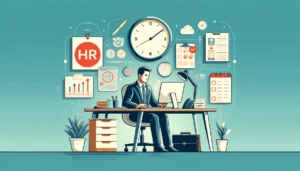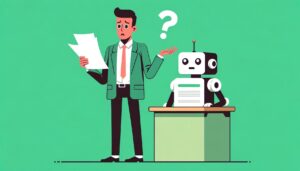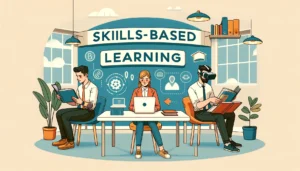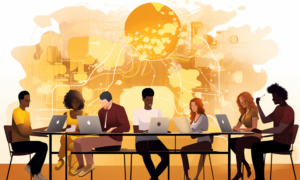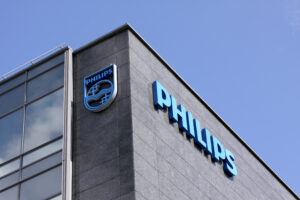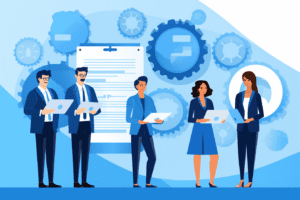How is artificial intelligence developing HR?
- 4 Min Read
The immediate feeling around artificial intelligence (AI) within the workplace and when considering the future of work can often be fear: fear of the unknown and fear that our jobs will disappear. However, embracing technology and new ways of working can open up a range of opportunities for both employees and the business.
- Author: Emily Sexton-Brown
- Date published: Feb 19, 2018
- Categories

The immediate feeling around artificial intelligence (AI) within the workplace and when considering the future of work can often be fear: fear of the unknown and fear that our jobs will disappear. However, embracing technology and new ways of working can open up a range of opportunities for both employees and the business.
Josh Bersin, principal and founder of Bersin at Deliotte, recently discussed how we should embrace technological advances in everyday life, citing his modern AI-enhanced car as an example. He stated that he isn’t afraid of his car – quite the opposite in fact.
Therefore, why are we afraid of technology that has been designed to improve our lives?
Through this simple example, Josh nicely puts into context for HR leaders the need to embrace and use technology to their advantage – and not shy away from it. The way HR in which professionals train and grow in their careers will change as we progress in this age of AI; therefore, it is imperative to stay ahead of the curve and implement AI into your people strategies to benefit the overall workforce.
Here are five ways in which advancements in AI can help your people develop, and improve the organisation’s outlook and output:
Recruitment
Given that The McKinsey Global Institute has estimated that 46% of Europe’s top five economies are steadily integrating AI right now, jobs will likely be disrupted and people will be expected to adapt to new ways of working. LinkedIn recently reported that repetitive jobs within recruiting, such as CV reading and data processing/correlating, will soon be automated – allowing human talent to be better used in more strategic aspects of the HR role.
Ensuring retention
Talent retention has always been a challenge for HR and is unfortunately becoming an ever more pressing issue. In fact, approximately 78% of business leaders consider retention important and/or urgent. Using AI platforms can give you key insights into what your employees are really looking for within their role and will allow you to start predicting behaviour patterns. Some of these findings could range from those who haven’t had pay increases for a considerable amount of time, those who are unhappy with their work-life balance, or those are feeling severely pressured in the workplace. This information will be correlated from what employees have chosen to share, allowing you to take action before a situation escalates.
Training and continuous development
Developments in technology can take the time-consuming elements out of developing employee training and L&D programmes, by organising and coordinating the needs of the employees/those undergoing training. Having platforms that offer online courses to start or develop careers further is a huge advancement in terms of allowing people to learn and develop in a way that suits them – the remote classroom and digital classes provide people the with the flexibility they need in this VUCA world.
Onboarding into the business
When you consider that companies with engaging onboarding programmes retain 91% of their employees, you begin to realise that this is not something to be underappreciated. AI can be customised to design onboarding programmes for specific roles. New starters need and deserve a lot of time, determining the correct level of support, guidance and resource can be calibrated by management, ensuring the new starter has ample support. In SHRM’s Onboarding report they cite Zappos’ onboarding model, in which they hold a 5-week programme. Once the programme is complete, they offer each employee $2000 to resign because they are so confident in their robust onboarding strategy. In fact, only 1% of new recruits go on to resign.
Monitoring performance
Being able to monitor engagement is arguably one of the most important aspects of an HR professional’s job. It’s sometimes difficult for humans to be able to track this accurately – but with the advancement in AI tools this issue should be eradicated. Another consideration is bias – or more to the point, unconscious bias. By using technology, this doesn’t occur or interfere with reporting and/or monitoring performance. AI is set to double economic growth by 2035; this will range from simple inputting of data to complicated problem-solving algorithms, which will leave no room for human error and ensure accuracy when monitoring how employees are performing. In a way, we are taking the human out of human resources, allowing AI to do the resourcing, and humans to create and breathe life into the people strategy.
Using and embracing this technology is important when crafting the rest of your career journey. Don’t be afraid to embrace new ways of working. CIPD Enterprises has exclusively partnered with AVADO to create inspiring learning experiences that deliver lasting impact and are all about your success. For more information, click here.


